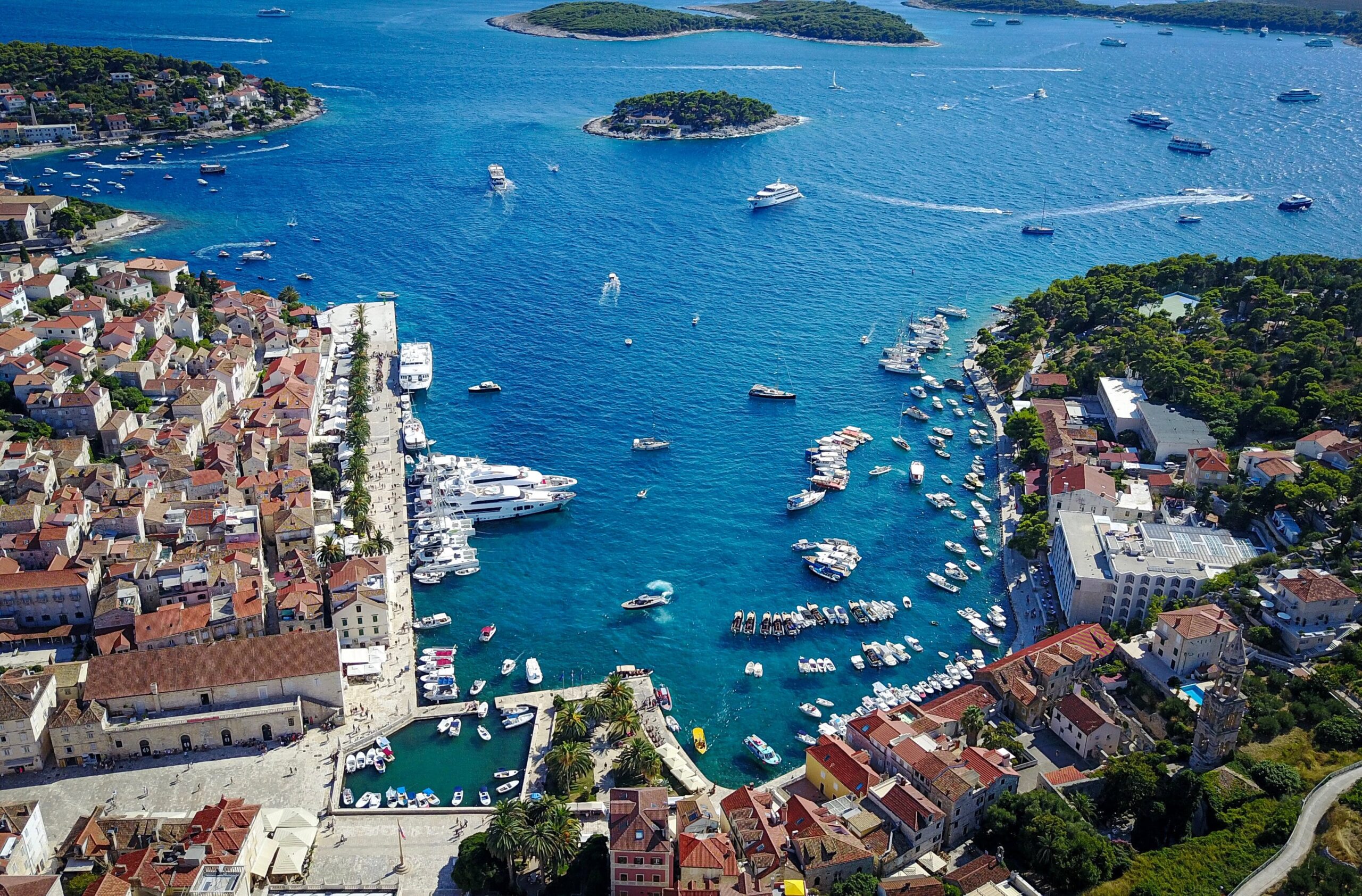These Six Cities Are Emerging as New Expat Hot Spots
As foreign workers flee places like Hong Kong, which are the destinations drawing the next generation of expats?
By Alice Kantor, Saritha Rai, Archana Narayanan, and Andrew Rosati
As Covid lockdowns, political upheaval and soaring costs drive expats from Hong Kong, and rival Singapore raises the bar for imported labor, young professionals looking for adventure and careers abroad are facing a dilemma. Which will be the cosmopolitan hotspots of the future to lure a vibrant international community with high-paid jobs and affordable luxury lifestyles?
While countries from Curacao to Cape Verde have rolled out digital nomad visas for web-based wanderers, building and retaining a large, cosmopolitan talent base takes more than a beach and a wi-fi connection. In a world reshaped by infection, invasion and inflation, a clutch of cities is challenging the old order, luring companies and start-ups to burnish their credentials as a global city. We talk to six workers who, from the beaches of Rio to the tech hub of Bangalore, are taking the road less traveled.
Kuala Lumpur
Long overshadowed by neighboring Singapore as a destination for expat workers, the Malaysian capital is becoming increasingly attractive to global businesses because of its large English speaking workforce, easy flight connections around the region and relative affordability. In 2021, the city ranked first in a worldwide survey of some 12,000 expats by InterNations, scoring top for housing.
“It’s a country at the crossroads of so many civilizations: South-east Asian, Chinese, Middle-Eastern, Indian,” said Caroline Pujo, who moved to Kuala Lumpur with her husband and 10-year-old son in January after 15 years living in Shanghai. “There is a lot of cultural and language variety, but there’s a real harmony in all that diversity.”
She spends about 3,000 ringgit ($682) a month on rent, and works as an event consultant, developing ties across the region with clients in places such as China, India and Australia. She’s also found a contract job as a project manager for a multinational firm.
“In Shanghai, everything is so fast,” said Pujo, 47, “I used to work super hard and party super hard. But once I left, I realized it was like being on drugs all the time. Now, things are bit more balanced for me.”
She said some things can be frustrating — such as a patchy internet connection — if you’re used to a city with very advanced infrastructure, but the tropical country’s resort islands and culture more than make up for the inconvenience.
“Traveling the islands, swimming in pools, flying around the region. That’s what life is about.”
Lisbon
One of the oldest cities in Europe, Lisbon has reinvented itself as a hipster destination, hosting events such as the annual Web Summit and offering a mix of culture, nightlife and warm weather within easy reach of some of Europe’s most spectacular beaches. Described last year by expat website Dispatches as “arguably the most popular expat destination in Europe at the moment,” Lisbon is enjoying a boom that has seen property prices steadily rise as an influx of wealthy immigrants buy houses in the capital or along the nation’s fabled Algarve coast.
Last August, Allison Baxley and her family swapped the 800-square-foot brownstone in Brooklyn they were renting for $4,300 a month for a three-bedroom house with a pool by the Portuguese coast at almost half the rate, a move she described as “escaping the rat race.”
She says Cascais — a ritzy beachside enclave along the coast from the Portuguese capital, is “a good landing spot for expats,” with an international community and good schools.
“New York got so crazy in the pandemic: the politics, crime rates were escalating all over the country” said Baxley, 39. “My kids were starting in public school and I was worried about the kind of upbringing I was giving them.”
Read more: Lisbon Tops Hybrid-Working Ranks for Globetrotting Executives
A freelance writer, her plan is to buy property around Portugal and rent it out.
“In New York we rented forever. We could never afford to buy,” she said. “The prices here in Portugal are going up but they’re not astronomical like New York.”
Her family enjoys the lifestyle in Cascais, where they can drive into central Lisbon in half an hour or so a few times each month to see friends, deal with administrative issues, and go to restaurants and museums. She’s also started writing about their life in Cascais in a blog she’s called Renovating Life.
“We just love it over here,” she said. “In New York, you’re working so hard all week long. By the weekend you’re exhausted. Here I’m able to enjoy every single day.”.
Dubai
The desert state has been challenging Hong Kong and Singapore for expat traffic for more than a decade now and the combination of the pandemic and war in Europe has made the Emirate even more popular. With the jagged spire of the Burj Khalifa soaring over a collection of futuristic architecture, Dubai has invested billions in creating a city of the future.
Bernd Hanke, partner of a London-based fund, moved here during the pandemic to escape rounds of lockdowns and Covid measures in Stuttgart, where he had been staying for nine months, joining a growing number of financial professionals relocating to a city that is bolstering its financial and cryptocurrency markets.
Hanke enjoys waking up to the lush green golf course view from his Emirates Hills accommodation, as well as the warmer climate, even though summer temperatures outside the air-conditioned homes and shopping malls can run to 45 Celsius (113 Fahrenheit). A time zone similar to Europe makes it easy for him to reach the UK-based investors in his $400 million equity fund.
“Dubai handled the pandemic very well and there was almost no lockdown,” said Hanke, 48, whose family is in London. Now he’s thinking about whether to make the move more permanent and buy property in Dubai.
“I would quite like to be in Dubai even for the longer run,” he said. “I have to make up my mind on that.”
Bengaluru (Bangalore)
Bengaluru, or Bangalore as it’s still called by many locals and expats, has become one of the world’s fastest-growing tech hubs, home to thousands of startups and software firms, fueled with money from global technology companies and blue-chip foreign investors such as Sequoia Capital and Goldman Sachs. Venture capital is flowing into the southern Indian city faster than to London or San Francisco by one estimate, surging to $7.2 billion in 2020 from $1.3 billion in 2016. With a growing expat community has come international schools, as well as bars and bistros that serve everything from craft beers to pork ribs.
New centers of innovation are emerging around the world, “and I see Bangalore as a burgeoning hub,’’ said Joseph Kim, 49, who left the San Francisco Bay Area last year to set up a gaming studio in the Indian city. “People are increasingly disaffected by Silicon Valley, its politics, the crime and the dismal state of education,” a combination of factors he says is prompting a “mass exodus” from the US technology heartland where he spent most of his career.
After attending a gaming conference in India in 2020, Kim joined two other cofounders to start Lila Games Pvt. in the teeming Indiranagar neighborhood in east Bengaluru, gaining backing from Sequoia.
“We considered Finland, Latin America and Canada before settling on Bangalore,” said Kim, an engineering graduate from UC Berkeley with an MBA from UCLA Anderson. “People here have a hunger to learn.’’
Still, like other locations on the subcontinent, Bengaluru can be challenging for those used to cities in the Western world, and Kim’s wife and kids remain in Santa Clara where he visits them once a quarter.
“Many things in Bangalore seem unfinished, including the roads and buildings, and everyone seems in a rush to get to the next thing,” he said. “But for the first time in a long time, I feel like I’m doing something worthwhile.’’
Mexico City
A vast urban sprawl of nearly 22 million people, Mexico City may seem an unlikely candidate for an expat haven, but the oldest capital in the Americas has been rapidly gaining attention as a center of entrepreneurs and startups in Latin America. Mexico topped the global ranking in InterNations’ 2022 Expat Insider ranking of the best countries to live in and its high-altitude capital is home to foreigners from all over the world. Blending seven centuries of history with some of the region’s most progressive policies — the city was the first in Latin America to legalize same-sex marriages — the capital is also home to one of the most vibrant restaurant scenes in the Americas.
Brian Requarth, CEO of startup-building platform Latitud, moved with his family in July to the Mexican capital’s tony Polanco neighborhood. “It’s kind of the Beverly Hills of Mexico City,” he said. “It’s quite fancy but it’s very safe.” Coming from a small town in Sonoma County, north of San Francisco, the family’s biggest culture shock was the sheer size of the metropolis.
“In my tiny town in California, my kids go to public school. It’s very small,” he said. When they visited their new school in Mexico City it was a bit shocking, he said. “It’s massive, twenty times bigger than the school they go to now, and there’s a Starbucks! It feels like a college campus instead of a little neighborhood school.”
Requarth, 41, sees interest surging in the Latin American tech sector, with startups mushrooming in Mexico City, which benefits from its proximity to the US technology industry.
“There’s an incredible level of talent and ambition in Latin America that didn’t exist before,” Requarth said. “There’s more people thinking of solving bigger problems through technology. I’ll be very productive here.”
Rio de Janeiro
Steeped in glamour for much of the 20th century, the former capital of the Portuguese empire boasts an iconic backdrop of tree-covered mountains surrounding one of the world’s most spectacular natural harbors. While the city suffered a decline in the 1990s, overshadowed by financial hub Sao Paulo, the laid-back vibe and world-famous beaches of Rio continue to hold an allure for foreigners moving to South America’s largest economy.
“I’m amazed how many foreigners I find working here,” said Marie Alasseur, 31, who runs B2B operations at Brazilian real-estate platform Loft.
Since doing a month-long language course in the coastal city of Salvador in 2009, the 31-year-old from Paris says she’s had “a call to Brazil.” After a stint in Hong Kong and employment with Uber in Sao Paulo, Mexico and London, Alasseur and her Brazilian boyfriend were considering moving to Spain or Portugal, but decided in the early months of 2020, just before the pandemic took hold of the world, to try Rio.
“I feel at home,” she said. “There’s a European soul here — it’s a Brazilian Paris.”
Through a former Uber colleague, Alasseur snagged a role at Loft and splits her working hours between her home, the company’s office and Ipanema expat hangout Aussie Coffee, which serves flat whites and homemade banana bread. True to Rio’s easy going vibe, she spends part of her mornings meditating or walking on the beach, and makes time occasionally for pottery classes.
“When you work at a startup there’s no limit to how much you can work,” she said. “I like the balance I have now. I learned to slow down last year and enjoy what I have.”
Source: Bloomberg




